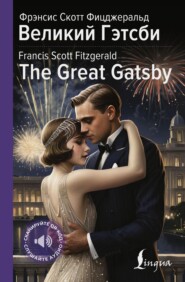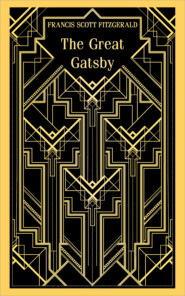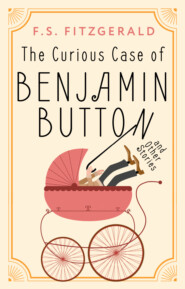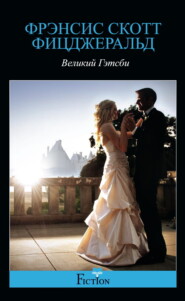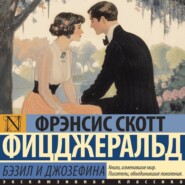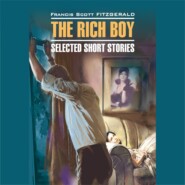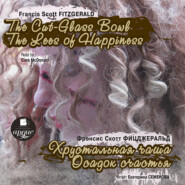По всем вопросам обращайтесь на: info@litportal.ru
(©) 2003-2025.
✖
«Великий Гэтсби» и другие лучшие произведения Ф.С. Фицджеральда
Год написания книги
2015
Теги
Настройки чтения
Размер шрифта
Высота строк
Поля
‘I beg your pardon,’ said Mr. McKee with dignity, ‘I didn’t know I was touching it.’
‘All right,’ I agreed, ‘I’ll be glad to.’
… I was standing beside his bed and he was sitting up between the sheets, clad in his underwear, with a great portfolio in his hands.
‘Beauty and the Beast… Loneliness… Old Grocery Horse… Brook’n Bridge[41 - Brook’n Bridge – Brooklyn Bridge that connects Brooklyn, a borough of New York City, to Manhattan]…’
Then I was lying half asleep in the cold lower level of the Pennsylvania Station, staring at the morning Tribune[42 - Tribune – here: the ‘New York Herald Tribune,’ an American daily newspaper], and waiting for the four o’clock train.
Chapter III
There was music from my neighbour’s house through the summer nights. In his blue gardens men and girls came and went like moths among the whisperings and the champagne and the stars. At high tide in the afternoon I watched his guests diving from the tower of his raft, or taking the sun on the hot sand of his beach while his two motor-boats slit the waters of the Sound, drawing aquaplanes over cataracts of foam. On weekends his Rolls-Royce became an omnibus, bearing parties to and from the city between nine in the morning and long past midnight, while his station wagon scampered like a brisk yellow bug to meet all trains. And on Mondays eight servants, including an extra gardener, toiled all day with mops and scrubbing-brushes and hammers and garden-shears, repairing the ravages of the night before.
Every Friday five crates of oranges and lemons arrived from a fruiterer in New York – every Monday these same oranges and lemons left his back door in a pyramid of pulpless halves. There was a machine in the kitchen which could extract the juice of two hundred oranges in half an hour if a little button was pressed two hundred times by a butler’s thumb.
At least once a fortnight a corps of caterers came down with several hundred feet of canvas and enough coloured lights to make a Christmas tree of Gatsby’s enormous garden. On buffet tables, garnished with glistening hors-d’oeuvre, spiced baked hams crowded against salads of harlequin designs and pastry pigs and turkeys bewitched to a dark gold. In the main hall a bar with a real brass rail was set up, and stocked with gins and liquors and with cordials so long forgotten that most of his female guests were too young to know one from another.
By seven o’clock the orchestra has arrived, no thin five-piece affair, but a whole pit full of oboes and trombones and saxophones and viols and cornets and piccolos, and low and high drums. The last swimmers have come in from the beach now and are dressing upstairs; the cars from New York are parked five deep in the drive, and already the halls and salons and verandas are gaudy with primary colours, and hair bobbed in strange new ways, and shawls beyond the dreams of Castile[43 - Castile – a historic region in central Spain]. The bar is in full swing, and floating rounds of cocktails permeate the garden outside, until the air is alive with chatter and laughter, and casual innuendo and introductions forgotten on the spot, and enthusiastic meetings between women who never knew each other’s names.
The lights grow brighter as the earth lurches away from the sun, and now the orchestra is playing yellow cocktail music, and the opera of voices pitches a key higher. Laughter is easier minute by minute, spilled with prodigality, tipped out at a cheerful word. The groups change more swiftly, swell with new arrivals, dissolve and form in the same breath; already there are wanderers, confident girls who weave here and there among the stouter and more stable, become for a sharp, joyous moment the centre of a group, and then, excited with triumph, glide on through the sea-change of faces and voices and colour under the constantly changing light.
Suddenly one of these gypsies, in trembling opal, seizes a cocktail out of the air, dumps it down for courage and, moving her hands like Frisco, dances out alone on the canvas platform. A momentary hush; the orchestra leader varies his rhythm obligingly for her, and there is a burst of chatter as the erroneous news goes around that she is Gilda Gray’s understudy from the Follies[44 - the Follies – a popular variety show]. The party has begun.
I believe that on the first night I went to Gatsby’s house I was one of the few guests who had actually been invited. People were not invited – they went there. They got into automobiles which bore them out to Long Island, and somehow they ended up at Gatsby’s door. Once there they were introduced by somebody who knew Gatsby, and after that they conducted themselves according to the rules of behaviour associated with an amusement park. Sometimes they came and went without having met Gatsby at all, came for the party with a simplicity of heart that was its own ticket of admission.
I had been actually invited. A chauffeur in a uniform of robin’s-egg blue crossed my lawn early that Saturday morning with a surprisingly formal note from his employer: the honour would be entirely Gatsby’s, it said, if I would attend his ‘little party’ that night. He had seen me several times, and had intended to call on me long before, but a peculiar combination of circumstances had prevented it – signed Jay Gatsby, in a majestic hand.
Dressed up in white flannels I went over to his lawn a little after seven, and wandered around rather ill at ease among swirls and eddies of people I didn’t know – though here and there was a face I had noticed on the commuting train. I was immediately struck by the number of young Englishmen dotted about; all well dressed, all looking a little hungry, and all talking in low, earnest voices to solid and prosperous Americans. I was sure that they were selling something: bonds or insurance or automobiles. They were at least agonizingly aware of the easy money in the vicinity and convinced that it was theirs for a few words in the right key.
As soon as I arrived I made an attempt to find my host, but the two or three people of whom I asked his whereabouts stared at me in such an amazed way, and denied so vehemently any knowledge of his movements, that I slunk off in the direction of the cocktail table – the only place in the garden where a single man could linger without looking purposeless and alone.
I was on my way to get roaring drunk from sheer embarrassment when Jordan Baker came out of the house and stood at the head of the marble steps, leaning a little backward and looking with contemptuous interest down into the garden.
Welcome or not, I found it necessary to attach myself to someone before I should begin to address cordial remarks to the passers-by.
‘Hello!’ I roared, advancing toward her. My voice seemed unnaturally loud across the garden.
‘I thought you might be here,’ she responded absently as I came up. ‘I remembered you lived next door to —’
She held my hand impersonally, as a promise that she’d take care of me in a minute, and gave ear to two girls in twin yellow dresses, who stopped at the foot of the steps.
‘Hello!’ they cried together. ‘Sorry you didn’t win.’
That was for the golf tournament. She had lost in the finals the week before.
‘You don’t know who we are,’ said one of the girls in yellow, ‘but we met you here about a month ago.’
‘You’ve dyed your hair since then,’ remarked Jordan, and I started, but the girls had moved casually on and her remark was addressed to the premature moon, produced like the supper, no doubt, out of a caterer’s basket. With Jordan’s slender golden arm resting in mine, we descended the steps and sauntered about the garden. A tray of cocktails floated at us through the twilight, and we sat down at a table with the two girls in yellow and three men, each one introduced to us as Mr. Mumble.
‘Do you come to these parties often?’ inquired Jordan of the girl beside her.
‘The last one was the one I met you at,’ answered the girl, in an alert confident voice. She turned to her companion: ‘Wasn’t it for you, Lucille?’
It was for Lucille, too.
‘I like to come,’ Lucille said. ‘I never care what I do, so I always have a good time. When I was here last I tore my gown on a chair, and he asked me my name and address – inside of a week I got a package from Croirier’s with a new evening gown in it. ’
‘Did you keep it?’ asked Jordan.
‘Sure I did. I was going to wear it to-night, but it was too big in the bust and had to be altered. It was gas blue with lavender beads. Two hundred and sixty-five dollars.’
‘There’s something funny about a fellow that’ll do a thing like that,’ said the other girl eagerly. ‘He doesn’t want any trouble with anybody.’
‘Who doesn’t?’ I inquired.
‘Gatsby. Somebody told me —’
The two girls and Jordan leaned together confidentially.
‘Somebody told me they thought he killed a man once.’
A thrill passed over all of us. The three Mr. Mumbles bent forward and listened eagerly.
‘I don’t think it’s so much that,’ argued Lucille sceptically; ‘it’s more that he was a German spy during the war.’
One of the men nodded in confirmation.
‘I heard that from a man who knew all about him, grew up with him in Germany,’ he assured us positively.
‘Oh, no,’ said the first girl, ‘it couldn’t be that, because he was in the American army during the war.’ As our credulity switched back to her she leaned forward with enthusiasm. ‘You look at him sometimes when he thinks nobody’s looking at him. I’ll bet he killed a man.’
She narrowed her eyes and shivered. Lucille shivered. We all turned and looked around for Gatsby. It was testimony to the romantic speculation he inspired that there were whispers about him from those who had found little that it was necessary to whisper about in this world.
The first supper – there would be another one after midnight – was now being served, and Jordan invited me to join her own party, who were spread around a table on the other side of the garden. There were three married couples and Jordan’s escort, a persistent undergraduate given to violent innuendo, and obviously under the impression that sooner or later Jordan was going to yield him up her person to a greater or lesser degree. Instead of rambling, this party had preserved a dignified homogeneity, and assumed to itself the function of representing the staid nobility of the countryside – East Egg condescending to West Egg and carefully on guard against its spectroscopic gaiety.
‘Let’s get out,’ whispered Jordan, after a somehow wasteful and inappropriate half-hour; ‘this is much too polite for me.’
We got up, and she explained that we were going to find the host: I had never met him, she said, and it was making me uneasy. The undergraduate nodded in a cynical, melancholy way.
The bar, where we glanced first, was crowded, but Gatsby was not there. She couldn’t find him from the top of the steps, and he wasn’t on the veranda. On a chance we tried an important-looking door, and walked into a high Gothic[45 - Gothic – a style in architecture, painting and sculpture in Western and Central Europe from the 12
century to the end of the 16th century] library, paneled with carved English Oak, and probably transported complete from some ruin overseas.
A stout, middle-aged man, with enormous owl-eyed spectacles, was sitting somewhat drunk on the edge of a great table, staring with unsteady concentration at the shelves of books. As we entered he wheeled excitedly around and examined Jordan from head to foot.
‘What do you think?’ he demanded impetuously.
‘About what?’
‘All right,’ I agreed, ‘I’ll be glad to.’
… I was standing beside his bed and he was sitting up between the sheets, clad in his underwear, with a great portfolio in his hands.
‘Beauty and the Beast… Loneliness… Old Grocery Horse… Brook’n Bridge[41 - Brook’n Bridge – Brooklyn Bridge that connects Brooklyn, a borough of New York City, to Manhattan]…’
Then I was lying half asleep in the cold lower level of the Pennsylvania Station, staring at the morning Tribune[42 - Tribune – here: the ‘New York Herald Tribune,’ an American daily newspaper], and waiting for the four o’clock train.
Chapter III
There was music from my neighbour’s house through the summer nights. In his blue gardens men and girls came and went like moths among the whisperings and the champagne and the stars. At high tide in the afternoon I watched his guests diving from the tower of his raft, or taking the sun on the hot sand of his beach while his two motor-boats slit the waters of the Sound, drawing aquaplanes over cataracts of foam. On weekends his Rolls-Royce became an omnibus, bearing parties to and from the city between nine in the morning and long past midnight, while his station wagon scampered like a brisk yellow bug to meet all trains. And on Mondays eight servants, including an extra gardener, toiled all day with mops and scrubbing-brushes and hammers and garden-shears, repairing the ravages of the night before.
Every Friday five crates of oranges and lemons arrived from a fruiterer in New York – every Monday these same oranges and lemons left his back door in a pyramid of pulpless halves. There was a machine in the kitchen which could extract the juice of two hundred oranges in half an hour if a little button was pressed two hundred times by a butler’s thumb.
At least once a fortnight a corps of caterers came down with several hundred feet of canvas and enough coloured lights to make a Christmas tree of Gatsby’s enormous garden. On buffet tables, garnished with glistening hors-d’oeuvre, spiced baked hams crowded against salads of harlequin designs and pastry pigs and turkeys bewitched to a dark gold. In the main hall a bar with a real brass rail was set up, and stocked with gins and liquors and with cordials so long forgotten that most of his female guests were too young to know one from another.
By seven o’clock the orchestra has arrived, no thin five-piece affair, but a whole pit full of oboes and trombones and saxophones and viols and cornets and piccolos, and low and high drums. The last swimmers have come in from the beach now and are dressing upstairs; the cars from New York are parked five deep in the drive, and already the halls and salons and verandas are gaudy with primary colours, and hair bobbed in strange new ways, and shawls beyond the dreams of Castile[43 - Castile – a historic region in central Spain]. The bar is in full swing, and floating rounds of cocktails permeate the garden outside, until the air is alive with chatter and laughter, and casual innuendo and introductions forgotten on the spot, and enthusiastic meetings between women who never knew each other’s names.
The lights grow brighter as the earth lurches away from the sun, and now the orchestra is playing yellow cocktail music, and the opera of voices pitches a key higher. Laughter is easier minute by minute, spilled with prodigality, tipped out at a cheerful word. The groups change more swiftly, swell with new arrivals, dissolve and form in the same breath; already there are wanderers, confident girls who weave here and there among the stouter and more stable, become for a sharp, joyous moment the centre of a group, and then, excited with triumph, glide on through the sea-change of faces and voices and colour under the constantly changing light.
Suddenly one of these gypsies, in trembling opal, seizes a cocktail out of the air, dumps it down for courage and, moving her hands like Frisco, dances out alone on the canvas platform. A momentary hush; the orchestra leader varies his rhythm obligingly for her, and there is a burst of chatter as the erroneous news goes around that she is Gilda Gray’s understudy from the Follies[44 - the Follies – a popular variety show]. The party has begun.
I believe that on the first night I went to Gatsby’s house I was one of the few guests who had actually been invited. People were not invited – they went there. They got into automobiles which bore them out to Long Island, and somehow they ended up at Gatsby’s door. Once there they were introduced by somebody who knew Gatsby, and after that they conducted themselves according to the rules of behaviour associated with an amusement park. Sometimes they came and went without having met Gatsby at all, came for the party with a simplicity of heart that was its own ticket of admission.
I had been actually invited. A chauffeur in a uniform of robin’s-egg blue crossed my lawn early that Saturday morning with a surprisingly formal note from his employer: the honour would be entirely Gatsby’s, it said, if I would attend his ‘little party’ that night. He had seen me several times, and had intended to call on me long before, but a peculiar combination of circumstances had prevented it – signed Jay Gatsby, in a majestic hand.
Dressed up in white flannels I went over to his lawn a little after seven, and wandered around rather ill at ease among swirls and eddies of people I didn’t know – though here and there was a face I had noticed on the commuting train. I was immediately struck by the number of young Englishmen dotted about; all well dressed, all looking a little hungry, and all talking in low, earnest voices to solid and prosperous Americans. I was sure that they were selling something: bonds or insurance or automobiles. They were at least agonizingly aware of the easy money in the vicinity and convinced that it was theirs for a few words in the right key.
As soon as I arrived I made an attempt to find my host, but the two or three people of whom I asked his whereabouts stared at me in such an amazed way, and denied so vehemently any knowledge of his movements, that I slunk off in the direction of the cocktail table – the only place in the garden where a single man could linger without looking purposeless and alone.
I was on my way to get roaring drunk from sheer embarrassment when Jordan Baker came out of the house and stood at the head of the marble steps, leaning a little backward and looking with contemptuous interest down into the garden.
Welcome or not, I found it necessary to attach myself to someone before I should begin to address cordial remarks to the passers-by.
‘Hello!’ I roared, advancing toward her. My voice seemed unnaturally loud across the garden.
‘I thought you might be here,’ she responded absently as I came up. ‘I remembered you lived next door to —’
She held my hand impersonally, as a promise that she’d take care of me in a minute, and gave ear to two girls in twin yellow dresses, who stopped at the foot of the steps.
‘Hello!’ they cried together. ‘Sorry you didn’t win.’
That was for the golf tournament. She had lost in the finals the week before.
‘You don’t know who we are,’ said one of the girls in yellow, ‘but we met you here about a month ago.’
‘You’ve dyed your hair since then,’ remarked Jordan, and I started, but the girls had moved casually on and her remark was addressed to the premature moon, produced like the supper, no doubt, out of a caterer’s basket. With Jordan’s slender golden arm resting in mine, we descended the steps and sauntered about the garden. A tray of cocktails floated at us through the twilight, and we sat down at a table with the two girls in yellow and three men, each one introduced to us as Mr. Mumble.
‘Do you come to these parties often?’ inquired Jordan of the girl beside her.
‘The last one was the one I met you at,’ answered the girl, in an alert confident voice. She turned to her companion: ‘Wasn’t it for you, Lucille?’
It was for Lucille, too.
‘I like to come,’ Lucille said. ‘I never care what I do, so I always have a good time. When I was here last I tore my gown on a chair, and he asked me my name and address – inside of a week I got a package from Croirier’s with a new evening gown in it. ’
‘Did you keep it?’ asked Jordan.
‘Sure I did. I was going to wear it to-night, but it was too big in the bust and had to be altered. It was gas blue with lavender beads. Two hundred and sixty-five dollars.’
‘There’s something funny about a fellow that’ll do a thing like that,’ said the other girl eagerly. ‘He doesn’t want any trouble with anybody.’
‘Who doesn’t?’ I inquired.
‘Gatsby. Somebody told me —’
The two girls and Jordan leaned together confidentially.
‘Somebody told me they thought he killed a man once.’
A thrill passed over all of us. The three Mr. Mumbles bent forward and listened eagerly.
‘I don’t think it’s so much that,’ argued Lucille sceptically; ‘it’s more that he was a German spy during the war.’
One of the men nodded in confirmation.
‘I heard that from a man who knew all about him, grew up with him in Germany,’ he assured us positively.
‘Oh, no,’ said the first girl, ‘it couldn’t be that, because he was in the American army during the war.’ As our credulity switched back to her she leaned forward with enthusiasm. ‘You look at him sometimes when he thinks nobody’s looking at him. I’ll bet he killed a man.’
She narrowed her eyes and shivered. Lucille shivered. We all turned and looked around for Gatsby. It was testimony to the romantic speculation he inspired that there were whispers about him from those who had found little that it was necessary to whisper about in this world.
The first supper – there would be another one after midnight – was now being served, and Jordan invited me to join her own party, who were spread around a table on the other side of the garden. There were three married couples and Jordan’s escort, a persistent undergraduate given to violent innuendo, and obviously under the impression that sooner or later Jordan was going to yield him up her person to a greater or lesser degree. Instead of rambling, this party had preserved a dignified homogeneity, and assumed to itself the function of representing the staid nobility of the countryside – East Egg condescending to West Egg and carefully on guard against its spectroscopic gaiety.
‘Let’s get out,’ whispered Jordan, after a somehow wasteful and inappropriate half-hour; ‘this is much too polite for me.’
We got up, and she explained that we were going to find the host: I had never met him, she said, and it was making me uneasy. The undergraduate nodded in a cynical, melancholy way.
The bar, where we glanced first, was crowded, but Gatsby was not there. She couldn’t find him from the top of the steps, and he wasn’t on the veranda. On a chance we tried an important-looking door, and walked into a high Gothic[45 - Gothic – a style in architecture, painting and sculpture in Western and Central Europe from the 12
century to the end of the 16th century] library, paneled with carved English Oak, and probably transported complete from some ruin overseas.
A stout, middle-aged man, with enormous owl-eyed spectacles, was sitting somewhat drunk on the edge of a great table, staring with unsteady concentration at the shelves of books. As we entered he wheeled excitedly around and examined Jordan from head to foot.
‘What do you think?’ he demanded impetuously.
‘About what?’







